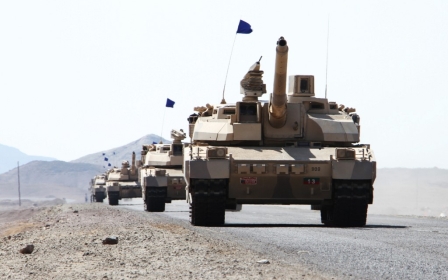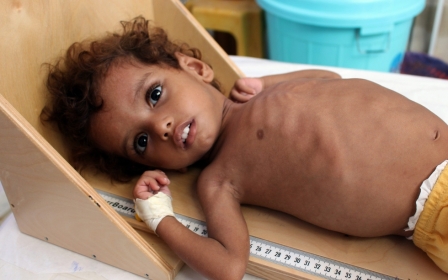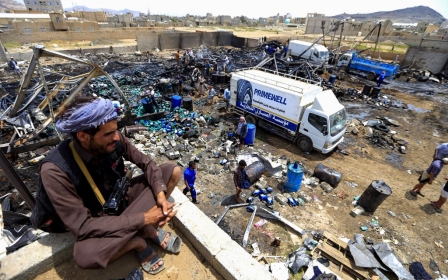'Disastrous decision': UK slashes aid to Yemen while approving arms sales to Saudi Arabia

The UK will halve its foreign aid to Yemen in 2021, in a move that has been widely condemned by politicians and non-governmental organisations.
Foreign Office Minister James Cleverley announced during a United Nations pledging conference for Yemen on Monday that the UK would commit £87m ($121m) in aid to the war-torn country in 2021.
The figure was significantly down from the £160m ($223m) pledged at the same conference last year, and the £214m ($2978m) total in UK donations to Yemen in 2020-2021.
"To respond to the crisis, the UK will provide at least £87m to Yemen over the course of the next financial year, bringing the UK's contribution since the start of this conflict to over £1bn," Cleverley told the conference.
The UN was hoping to raise $3.85bn during the virtual summit, which involved more than 100 governments and donors, however only $1.7bn was pledged. Last year, aid agencies received about $1.9bn, roughly half of what was needed.
New MEE newsletter: Jerusalem Dispatch
Sign up to get the latest insights and analysis on Israel-Palestine, alongside Turkey Unpacked and other MEE newsletters
"Millions of Yemeni children, women and men desperately need aid to live. Cutting aid is a death sentence," UN Secretary-General Antonio Guterres said.
The UK's reduction will be a significant blow to reaching the 2021 target. The cut forms part of the government's controversial announcement in November that it would reduce its annual foreign aid budget from 0.7 percent of the GDP to 0.5 percent.
Politicians and NGOs condemn decision
Former Foreign Secretary Jeremy Hunt said the decision was "deeply disappointing" and that the timing was "inexplicable", after the UN warned last week that Yemen was facing the worst famine in decades.
"This feels like an inevitable consequence of the flawed decision to step away from the 0.7 percent commitment," said Hunt, who ran against Prime Minister Boris Johnson for leadership of the Conservative Party in 2019.
"Abandoning a forgotten country and people is inconsistent with our values, weakens our moral authority and reduces our influence. We should be increasing the scale of our support in the face of such suffering - to cut it at this moment of extreme peril is incomprehensible."
David Miliband, the former UK foreign secretary who is now the CEO of the global humanitarian charity the International Rescue Committee, accused the government of "compounding the damage of six years of fruitless war".
"It is hard to imagine a more self-defeating decision for the UK or disastrous decision for Yemenis," Miliband said. "Make no mistake, as the UK abandons its commitment to 0.7 per cent, it's simultaneously undermining its global reputation.”
Meanwhile, Conservative MP and former international development secretary Andrew Mitchell said the decision would “condemn thousands of children to starvation”.
"It makes no foreign policy sense at all. Rather, it is the consequence of breaking a promise made in our manifesto," he said.
On the opposition benches, Shadow Foreign Secretary Lisa Nandy called the move a "deeply depressing statement of intent from the government".
"Despite all the talk of Global Britain, this is us abandoning our moral obligations, pulling further away from our allies and stepping back just as the USA steps up."
US Secretary of State Antony Blinken pledged during the conference that Washington would donate $191m in aid to Yemen this year, down $35m from the amount announced last year.
UK continues to arm Saudi-led coalition
In January, President Joe Biden announced a temporary freeze on pending arms sales to Saudi Arabia and the United Arab Emirates, as part of an effort to end the war in Yemen.
Despite its ally's decision, the UK has confirmed that it will continue arming the Saudi-led coalition in Yemen.
Last month, the latest government figures showed that London authorised the sale of $1.88bn worth of arms to Riyadh - including missiles and bombs - between the period of July and September 2020.
"This is a devastating cut to aid and is all the more heinous given that this is a crisis that the UK has helped to create," said Sarah Waldron of the Campaign Against Arms Trade.
"The UK bears direct responsibility for this unfolding catastrophe through its weapons supplies, and unquestioning support for the Saudi-led coalition that has destroyed so much of Yemen’s infrastructure."
Last week, global charity Oxfam, which provides humanitarian support in Yemen, accused the British government of “prolonging” the civil war by arming Saudi Arabia.
"At a time that the US seems to be evaluating its relationship with Saudi Arabia, we would urge the UK government to do the same and stop its arms sales to Saudi Arabia which are fuelling the conflict in Yemen," Mushin Siddiquey, Oxfam's Yemen director, told Middle East Eye.
In response to the halving of funds, a Foreign, Commonwealth and Development Office spokesperson said: "The UK remains steadfast in our support to the Yemeni people as one of the biggest donors of lifesaving aid and through our diplomatic efforts to bring peace.
"Since the conflict began, we have supported millions of vulnerable Yemenis with food, clean water and healthcare, and will continue to do so. We are using our UN Security Council seat and working with our allies to push for a lasting resolution to the conflict. Yemen’s leaders must meaningfully engage with the UN to agree a ceasefire."
Middle East Eye delivers independent and unrivalled coverage and analysis of the Middle East, North Africa and beyond. To learn more about republishing this content and the associated fees, please fill out this form. More about MEE can be found here.






